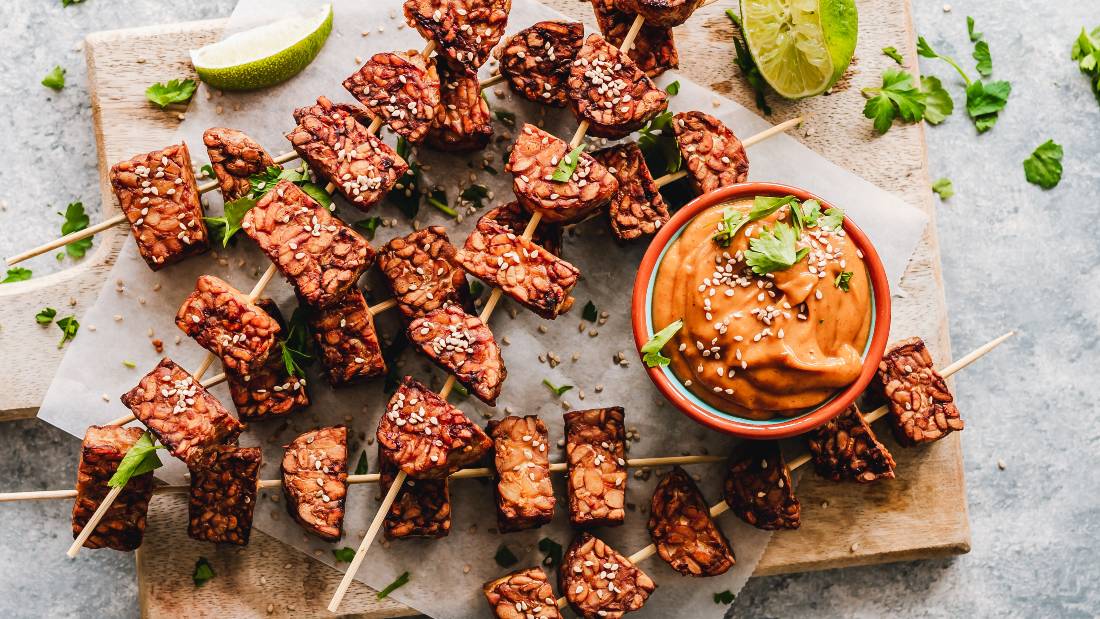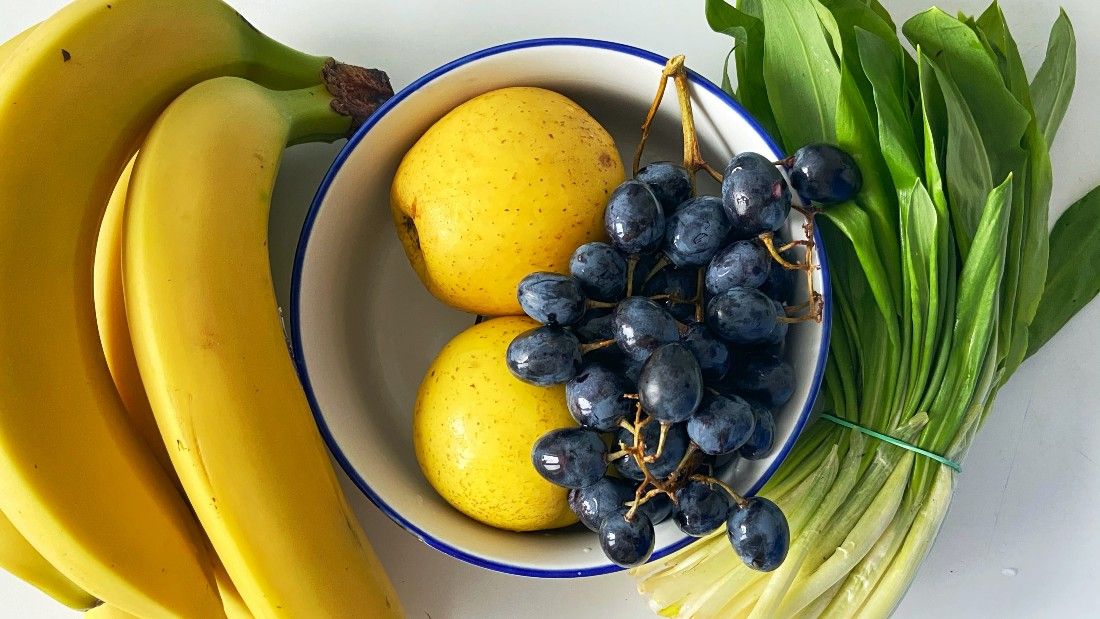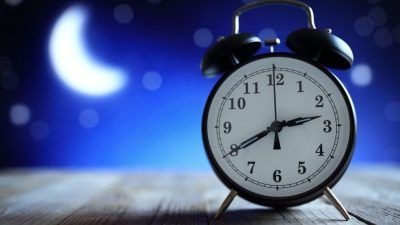12 Ways to Boost Your Battery When You’re Feeling Drained

We all have days when our energy feels low, but if it’s an ongoing problem and you don’t have any underlying condition, fatigue and tiredness may be due to a number of dietary and lifestyle factors. Here are 11 ways you can boost your body battery when you’re feeling drained.
Dial in your diet

1. Count on calories – from good quality sources
The first question to ask yourself if you’re lacking energy is “are you eating enough?” Instead of counting calories to cut back, some people need to count calories to make sure they’re getting enough to meet their energy needs.
When people switch to a plant-based diet, some report feeling hungrier than they were on a typical Western diet. This is because you may need to pack more onto your plate to get the same amount of calories as before. And calories are important because our body burns them to produce energy.
Make sure that you have several portions of fruit and vegetables, pulses, wholegrains and nuts and seeds every day. If you struggle to eat all the calories your body needs, it may be useful to focus on high-calorie foods such as nut butters, avocado, quinoa, olive oil and dried fruit, or adding a healthy smoothie, including some of these ingredients, between your main meals.
2. Pump up the protein
Protein deficiency is very rare in Western societies (and usually the result of disease or ageing rather than diet) but symptoms might include: low energy levels, fatigue, poor concentration and trouble learning new information. So, although vegans might be tired of being asked “where do you get your protein?”, it’s may be worth considering if you’re lacking energy and focus.
According to current guidelines, an average person needs 0.8 grams of protein daily per kilogram of bodyweight – but this could be more if you’re trying to build muscle or are very active. As we age, our bodies struggle to absorb protein as efficiently, so if you’re over 65 years old, you may need to increase your protein intake to between 1.2 and two grams daily per kilogram of bodyweight. Although high protein diets have been linked to shorter lifespans, more recent data suggest that it’s animal protein specifically (and what it comes with, within the ‘food package’) that has this deleterious effect, whereas increasing plant protein increases longevity.
Try adding some high-protein plant-based foods to your diet, including: tofu, tempeh, pulses, quinoa and mycoprotein, like vegan-friendly Quorn products. If you still struggle to get enough, a plant-based protein powder may be a useful insurance policy against deficiency.
3. Call on complex carbohydrates
We’ve all felt that afternoon slump after a large lunch. But lunch shouldn’t leave us feeling lethargic, it should leave us energised for the afternoon ahead. An afternoon slump is usually the result of a super-sized lunch heavy on junk food and refined carbohydrates, such as white bread, pasta, crisps, sugar-laden desserts and fizzy drinks.
These foods cause our blood-sugar to sharply rise and then dramatically drop, leaving us slumped over our desk. Instead, we should rely on complex carbohydrates to give us a slow, steady and sustained release of energy. These include wholegrains such as oats, wholemeal bread and wholewheat pasta, quinoa and brown rice, beans, sweet potatoes and other vegetables, and whole fruit.
4. Stay hydrated
Water is vital for many processes in the body and when we’re dehydrated our body suffers the consequences. Dehydration can leave us feeling perpetually fatigued and weak, and plagued by headaches and bad moods. When we’re dehydrated the flow of oxygen to our brain is reduced and our heart has to work overtime.
Make sure you’re drinking enough water throughout the day, especially on hot days and if you’re exercising a lot. If you perspire a lot during exercise, you may want to consider having a good quality electrolyte drink – or adding an electrolyte tablet to your water – to replace the electrolytes, such as sodium and potassium, lost through sweat.
However, it’s best not to rely on sweet and caffeinated drinks too often as they can make you feel more tired in the long run. Sweetened beverages can give you a quick energy boost but it’s often followed by a drastic crash. Drinking caffeine after midday may help you get through the post-lunch lull, but it will likely reduce your sleep quality in the night. This could leave you feeling even more tired the next day and once again reaching for the quick fixes in a vicious cycle of chasing energy.
Vital vitamins and minerals

5. Iron
Iron helps transport oxygen around the body and is an important nutrient for vegans and non-vegans alike. Signs of deficiency include tiredness, weakness, feeling cold and difficulty concentrating.
A 2020 systematic review of randomised controlled trials concluded that: “Given the global prevalence of both iron deficiency and fatigue, patients and practitioners could consider consumption of iron-rich foods or iron supplementation to improve symptoms of fatigue in the absence of documented anaemia.” In other words, if you’re lacking energy, it’s worth checking you are getting enough iron in your diet.
The best sources include wholegrains, pulses, tempeh, tofu, pumpkin and chia seeds, cashew nuts, tahini, dried apricots, prunes, figs, broccoli, kale, spinach, cabbage, blackstrap molasses and cocoa. Vitamin C helps iron absorption from food, while tea and coffee hinder it. If you want, you can also try chlorella – microalgae rich in iron and available as a green powder or tablets.
6. B12 and other B vitamins
Another essential nutrient is vitamin B12, which plays an important role in your nervous system and blood cell formation. In fact, all B vitamins play an important role in energy production systems within cells. Vitamin B12 also helps our body transform food into glucose, which we burn for energy. It therefore makes sense that one of the earliest signs of vitamin B12 deficiency is fatigue and listlessness.
Unfortunately, vitamin B12 doesn’t naturally occur in many foods anymore due to modern production methods so we need to take a supplement. It’s recommended that we take 50 micrograms daily or 2,000 micrograms weekly. Some foods such as dairy alternatives, breakfast cereals and nutritional yeast are fortified with B12, but don’t rely on these alone.
7. Magnesium
Magnesium helps regulate blood sugar levels and is vital for energy and protein metabolism. It is also essential for forming the so-called ‘happy hormones’, neurotransmitters in the brain (more on these later). This miraculous mineral helps our body relax and ensures we get a good night’s sleep.
Luckily for us, magnesium is found in the green pigment chlorophyll in the leaves of plants, so it’s abundant in a plant-based diet rich in leafy greens. It’s also plentiful in wholegrain foods, nuts, seeds and pulses. If you’re eating a varied, healthy vegan diet, you shouldn’t need to take a supplement unless you’re suffering from serious insomnia.
Looking at lifestyle

8. Get enough sleep
Even if you’ve dialled in your diet to perfection, you’ll still feel rotten if you don’t get enough sleep. For many years now, sleep has been underappreciated and even discouraged in the “I’ll sleep when I’m dead” culture. The truth is, if you don’t prioritise sleep, you may be dead sooner than you would expect.
Sleep is divided into two main types: rapid eye movement (REM), when we dream, and non-REM sleep. It’s during the non-REM phase when we experience deep sleep, and our body repairs and renews itself. According to research from Harvard Medical School, “This stage of sleep appears to be the one that plays the greatest role in energy, enhancing your ability to make ATP, the body’s energy molecule.” ATP is the universal energy “currency” for all known life forms.
The preparation for getting a good night’s sleep doesn’t start five minutes before bed, but as soon as you wake up in the morning. Each morning, try to take in some natural sunlight as soon as you can to set your circadian rhythm (your natural body clock). Other ways to improve your sleep include: exercising during the day, avoiding caffeine after midday, dimming lights and switching off screens at least an hour before bed, eating your last meal three hours before bedtime, and keeping the bedroom cool. Click here for 10 more tips to help you sleep.
9. Move your body
When you’re low in energy, exercising might be the last thing you want to do, but a little movement goes a long way. When we exercise we produce more mitochondria within our muscle cells, which turn glucose from the food we eat into fuel (it’s that ATP molecule again – the currency of energy). Exercise also increases oxygen levels in our blood and releases hormones called endorphins, which are known as ‘feel good’ chemicals because, well, they make you feel good. Exercise will also help you sleep better so you wake up more refreshed – just make sure you’re not working out right before bedtime so your body has had time to cool and calm down before you hit the hay.
If you spend most of your day sitting at a desk, make sure you take regular breaks to get up and move around so you’re not in the same position for too long. A study in the British Medical Journal found that “intermittent light-walking breaks resulted in an attenuation of fatigue levels during uninterrupted sitting.” If you can take meetings and phone calls while walking around, even better. If you’re already exercising a lot but still feeling tired, rather than exercising even more, perhaps you need to increase the time you allow for rest and recovery.
10. Reduce stress and anxiety
Stress and anxiety can really drain our energy and leave us feeling completely wiped out. We all experience some stressors in life so it’s important to be able to manage them effectively.
Stress management strategies might include therapy, daily meditation, journaling, exercise and self-care days. If you’re constantly busy you may be worn down or close to becoming burnt out so it’s important to allow yourself some down-time to recharge your battery. Burnout is especially common with activists but remember: if we’re in this for the long game, we need to find a sustainable way to maintain our effort.
11. Have fun
Having fun can be an important part of staying mentally, and therefore physically, healthy. Meeting up with good friends, having a games evening, cooking for friends or family, or going out to see live music or a film can help. Having fun, like exercise, releases beneficial hormones which make us feel good and fill us with energy. Participating in enjoyable activities and laughing with others relieves stress, anxiety and depression and, if done with others, strengthens social bonds.
12. Support serotonin production
Serotonin aka the ‘happy hormone’ is actually a neurotransmitter – a messenger that relays information between different parts of the brain and nervous system. It plays an important role in regulating sleep and our mood, and deficiency can result in chronic fatigue.
Serotonin is made from the amino acid tryptophan, which we cannot make so must obtain it from our diet. Fortunately, there are many food sources and eating them gives your body more material to manufacture serotonin. These foods include nuts, seeds, soybeans (edamame), tofu and tempeh, pulses, oats, wheat germ, bananas, spinach and other leafy greens. Research shows that combining tryptophan-rich foods with carbohydrates increases brain levels of tryptophan and serotonin.
According to a study published in The Journal of Psychiatry and Neuroscience, other ways to increase serotonin include meditation (or “positive mood inductions”), regular exercise and exposure to sunlight. So, our body’s successful production of serotonin relies on us acting on all of the tips already given – by following a healthy plant-based diet and implementing healthy lifestyle choices.
Next time you’re experiencing a lull in energy levels, consider some of these points. What have you eaten? Are you hydrated? Have you been getting enough sleep? Have you done any physical activity recently? It’s rare that just one factor is the answer to our problems but a little tweak here and there, like cutting out refined carbohydrates at lunch and going to bed 30 minutes earlier, could have impressive downstream effects on your energy levels.







